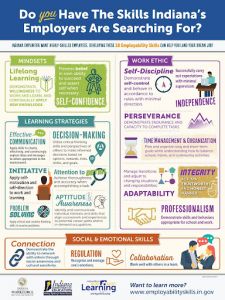 School counselors’ time is best spent providing services to all students enrolled in school to help them realize their best selves academically, socially, emotionally, and to become prepared for whatever postsecondary options they choose to pursue after high school. Many factors go into students being prepared, including test scores, grades, attendance, and discipline. We also know that students do better when they can get along with others, solve conflicts, and show self-discipline and perseverance; all of the so-called “soft skills” are repeatedly shown to be the most important to employers. So, how do we gather and share data that shows how students are different as a result of the school counseling program? Let’s use the 5 Ws to find out.
School counselors’ time is best spent providing services to all students enrolled in school to help them realize their best selves academically, socially, emotionally, and to become prepared for whatever postsecondary options they choose to pursue after high school. Many factors go into students being prepared, including test scores, grades, attendance, and discipline. We also know that students do better when they can get along with others, solve conflicts, and show self-discipline and perseverance; all of the so-called “soft skills” are repeatedly shown to be the most important to employers. So, how do we gather and share data that shows how students are different as a result of the school counseling program? Let’s use the 5 Ws to find out.
WHO: There are many people we can share data with: administrators, teachers, students, families, community members, the school counseling advisory committee, the school board, and everyone. Really… I mean everyone! Today, more than ever, we need to educate people on what school counselors are trained to do and not what they remember from when they were in school or may have heard from someone else. There is so much misinformation about school counseling we must make sure we set the record straight.
WHAT: Ideally, we want to share all the data we can, but let’s be realistic. There are not always enough hours in the day to do that. The next best thing is sharing data that aligns with our building or district goals. Every school in Indiana has a school improvement plan (SIP). When was the last time you looked at yours? Even better, are you a part of the SIP committee? Take some time to look over your SIP. Are school counselors specifically mentioned, and if so, what data metrics are attached? Sometimes, school counselors have a difficult time knowing how we can support things like reading levels or SAT scores, but if you think about it, it is in our sphere of influence. For example, test scores may lag for many reasons. Students not coming to school, students in the office often for discipline, test anxiety, not understanding the importance of tests, and lack of access to tutoring are just a few examples. These are all things school counselors can impact either directly with students or via advocacy.
“Share the data related to interventions that impact outcome data (achievement, attendance, and behavior) listed in the School Improvement Plan.”
Share the data related to interventions that impact outcome data (achievement, attendance, and behavior) listed in the SIP. Did you do a small group for students experiencing test anxiety? Did you do check-in check-out with students who are chronically absent? Did you deliver a classroom lesson on the importance of grades? Share how many students were impacted, share the pre-/post-test results, and draw the through line to how these activities played a role in improving student outcome data.
WHEN: Share data as often as possible. Process or participation data can be shared to show what you are doing with your time; it lets people know you are busy providing services to students rather than just busy being busy. Perception or Mindsets & Behavior data should also be shared as often as possible to show what students believe, know, and can do as a result of the lesson or intervention. Share outcome data related to comprehensive school counseling program (CSCP) activities at least once a year to illustrate how students are different because of the CSCP.
WHERE: Data can be shared in many places and formats. Share in your CSCP or school newsletter, on social media, on a bulletin board, or a one-pager in the teachers’ lounge. Present your data to your school counseling advisory committee, during a staff meeting, or to the school board. Always share data in meetings with your admin so they see the value the CSCP brings to students and the school. Wherever you decide to share, use graphs and charts that convey how students are different at a glance. Utilize color and callouts to make the data easy to understand.


WHY: As school counselors, our ethics and professional standards require us to share the results of our CSCP. Doing so lets others know the value we bring to the school. Without data, we have no proof our actions impact student outcomes. Without data, we may not have solid reasons to advocate for removing non-counseling duties or to provide support when we advocate for systemic changes. And without data, we can’t prove that the classroom lessons, interventions, and programs we deliver have had the impact that we intended. While tracking, analyzing, and sharing data can be time-consuming, it is necessary for establishing our legitimacy in the school and also allows us to become more efficient and effective over time. Who doesn’t want that?
Resources
Please login or register to claim PGPs.
Alternatively, you may use the PGP Request Form if you prefer to not register an account.



